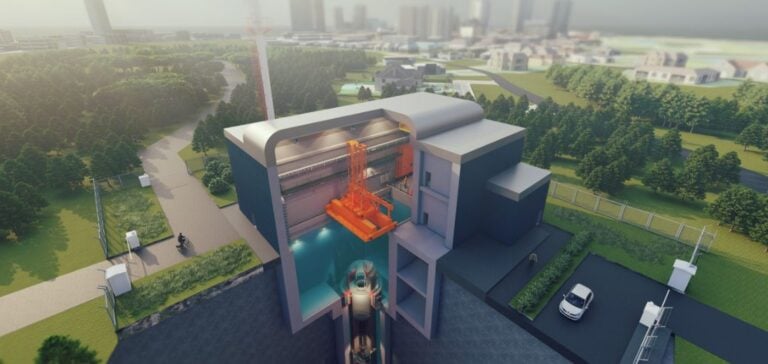Calogena, a startup specializing in innovative nuclear technologies, has officially filed its safety option application (DOS) for a 30-megawatt (MW) thermal nuclear boiler. This facility, using uranium fuel, is designed to supply urban heat networks with carbon-free energy, aiming to reduce cities’ reliance on fossil fuels.
The Gorgé Group, supporting Calogena in this initiative, described this submission as a “major milestone” in realizing the project. According to the company’s press release, this file marks the culmination of several months of preparatory review with ASN, during which the technical characteristics of this boiler were thoroughly examined. The project now enters a pre-assessment phase, expected to last approximately two years before potentially moving to the next step: the review of the creation authorization application (DAC). ASN, the French nuclear facility regulator, has confirmed receipt of the file and the commencement of the preliminary assessment process.
A growing urban market
The uniqueness of Calogena’s solution lies in the use of research reactor technologies, known as “pool-type” reactors, which are well-known to authorities and recognized for their increased safety. These small modular reactors (SMRs) are significantly smaller in power than traditional nuclear reactors, allowing for potential installation near urban centers. According to Julien Dereux, CEO of Calogena, the design includes multiple safety barriers to prevent core meltdown, a central concern in nuclear reactor design.
The commercial potential of this nuclear boiler is substantial. Calogena sees in the urban heating market a promising sector, especially in Northern and Eastern Europe, where demand for low-carbon heating is on the rise. This sector currently represents several tens of billions of euros, motivating the company to explore multiple sites in France and Finland for a first installation.
Calogena, an advanced French SMR project
With this project, Calogena positions itself as one of the pioneers in the SMR field in France. The company is moving closer to the first commissioning, a strategic goal in a sector still dominated by large electricity-producing reactors. Unlike these reactors, Calogena’s boiler is specifically designed for heating, enabling the supply of heat networks with a low-carbon energy source. According to Gorgé Group, the use of commercially available fuel and an existing reprocessing chain adds a practical and sustainable dimension to the project.
Calogena’s application for approval comes in a context of heightened competition in the SMR market in France. EDF, for instance, has also launched initiatives in this area with the Nuward project, although it is currently revising its design. Additionally, other startups like Jimmy are exploring similar technologies and have already initiated procedures to obtain a DAC. However, Calogena appears to be the French startup closest to commercializing a functional SMR.






















